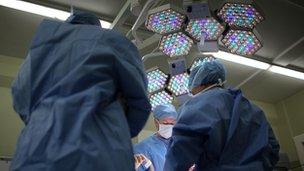NHS funding gap costs hospitals £500m, survey finds
- Published

A review of the way hospitals get paid for emergency admissions is under way
England's NHS hospitals lost more £500m of income last year because of a rule governing the way they get paid for emergency patients, a survey reveals.
The Foundation Trust Network polled its members and found many were unhappy with the "30% margin rule".
It limits how much money hospitals get for emergency admissions, in order to discourage over-reliance on A&E.
The Department of Health says its priority is to ensure the NHS is fairly reimbursed for services provided.
Emergency admissions
The 30% marginal rate rule was introduced in 2010 following concerns over the growth in emergency admissions.
Once hospitals reach a set number of emergency admissions they only get 30% of the full cost of treating the patient thereafter.
The idea is that the remaining 70% of the money can be invested into other services, such as primary care, which should reduce inappropriate A&E referrals.
A survey carried out by the Foundation Trust Network (FTN) reveals 96% of its members think the marginal rate is not achieving this aim.
According to the FTN, emergency admissions have gone up by 35%.
FTN's chief executive Chris Hopson told File on 4: "We've got a growing elderly population who are sicker, so hospitals are having to admit more patients.
"But they're only being paid 30% of the cost of treating many of those patients because of the way that this tariff works.
"Some of these hospitals have reached a tipping point, going into deficit.
"Overall, hospitals in England are losing somewhere between £500m and £600m a year by not being paid the full cost."
'Toughest financial year'
Nottingham University Hospitals NHS Trust chief executive Peter Homa argues its own 14% rise in numbers of emergencies occupying beds is largely beyond the trust's control.
"We're here to serve patients, often at the most difficult times of their lives and that's a very important responsibility that we discharge. We aren't able to deflect patients to other centres," he said.
Mr Homa told the programme the marginal rate rule had significantly reduced income.
"Nottingham lost £8.5m last year as a consequence of that on top of the toughest financial year we've ever had.
"The tariff discount is both out of date and unproductive."
Under Department of Health guidelines, GP's, hospitals and others are expected to agree local plans to invest the remaining 70% on measures to try to improve community patient care.
But according to the Foundation Trust Network there is little evidence that is happening.
'Not good enough'
In its survey, 52% of its members said they had not been consulted about how the money should be spent.
A further 74% said that the money had not been reinvested in preventing emergency admissions.
The organisation is now calling for the policy to be abolished.
"Unless we get change, we are going to see real financial distress in a number of hospitals as a result of this policy," said Chris Hopson.
Inappropriate admissions
The health regulator Monitor is conducting a review.
Monitor's chief executive, Dr David Bennett told File on 4 he recognised concerns over the policy.
"It's not clear what the 70% is being used for," he said.
"What we need is a much more transparent process where everybody and in particular the acute hospitals themselves can see that that 70% has been invested in reducing their admissions."
The Foundation Trust Network believes much of it has been used to prop up the core budgets of primary care group commissioning bodies, instead of specific measures to stem the rising numbers of frail, vulnerable and elderly occupying hospital beds.
But Dr Michael Dixon, interim president of the NHS Clinical Commissioners, disputes this.
"The money the hospital didn't get was used in other priorities and not misspent," he said
"It's gone into all other things that clinical commissioning groups do in primary care and in health."
NHS England is currently carrying out a review into how the emergency and urgent care system is run. In the meantime, some of the money kept back under this funding rule is being made available to the hospitals with the most acute problems.
Listen to the full report on File on 4 on BBC Radio 4 on Tuesday, 2 July at 20:00 BST and Sunday, 7 July at 17:00 BST. Listen again via the Radio 4 website or the File on 4 download.
- Published15 May 2013
- Published2 July 2013
- Published4 June 2013
- Published22 April 2013